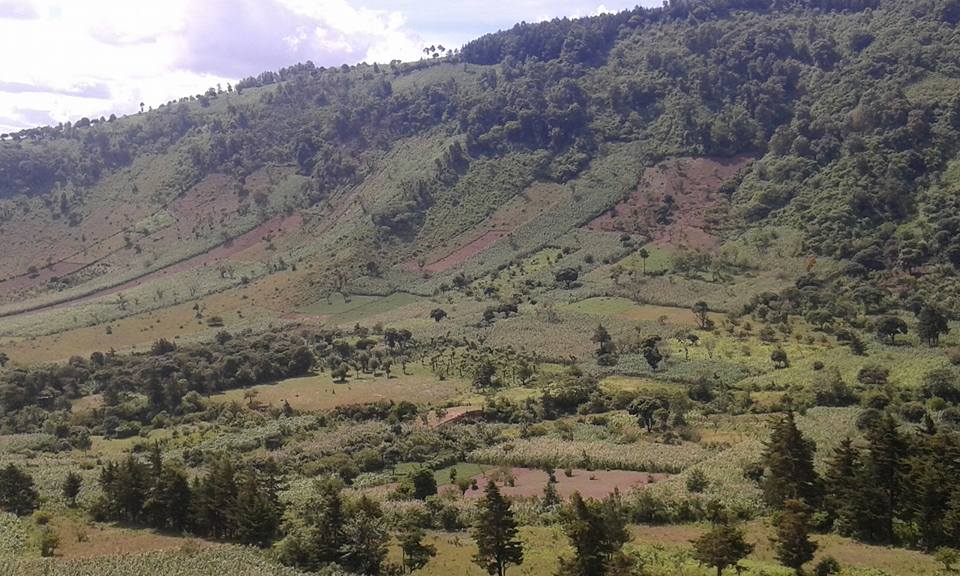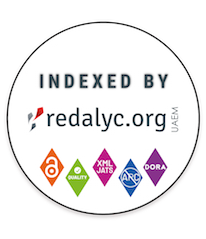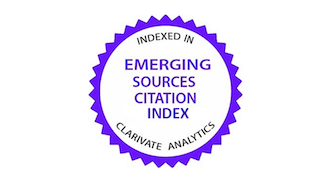Climate change perceptions and adaptive responses of small-scale farmers in two Guatemalan landscapes
DOI:
https://doi.org/10.15517/am.v30i2.33938Keywords:
basic grains, coffee, adaptation, farm management, climate change perceptionAbstract
Introduction. The productivity of certain crops such as coffee (Coffea arabica L.), maize (Zea mays) and beans (Phaseolus vulgaris L.) is expected to decline in Central America because of climate change. This will impact regional economies and livelihoods of smallholder farmers relying on these crops for their food security and livelihoods. There is a need to understand how climate change is already impacting smallholder farmers in Guatemala in order to promote adaptation measures that will allow them to face these impacts. Objective. The objectives of this study were to characterize two Guatemalan small-scale agricultural systems, describe farmers’ perceptions of climate change and impacts, and document their adaptation efforts. Materials and methods. Structured surveys were carried out in households growing coffee or basic grains in Acatenango and Chiquimula landscapes, two climate change vulnerable landscapes, between June and July 2014. The research was based on farmers’ perceptions of changes in temperature and rainfall, the impacts related to these changes, and the adaptation actions implemented in response to perceived changes. Results. Results indicated that 95% of farmers perceived changes in climate, and 81% of them considered these changes to have negatively affected their production. Only 41% of farmers had implemented measures to adapt to these changes, mainly those farmers growing coffee. The implemented adaptation measures differed between landscapes , crops, and usefulness against perceived change with tree planting being the most common adaptation practice to buffer against temperature increases. Conclusion. In order to improve the adaptive response ofsmallholder farmers and to promote the use of practices that increase resilience, it is neecessaryto provide more technical, financial and political support to facilitate the adaptation of small farmers facing climate change.
Downloads
References
Altamirano, J.A. 2012. Influencia de la variabilidad climática sobre la producción de café (Coffea arabica L.) en Honduras. Tesis MSc., CATIE, Turrialba, CRI.
Alpizar, F., C.A. Harvey, M. Saborío-Rodríguez, B. Viguera, M.R. Martínez-Rodríguez, and R. Vignola. 2019. Household survey of climate change perception and adaptation strategies of smallholder coffee and basic grain farmers in Central America 2004-2014. UK Data Service, Colchester, Essex, GBR. http://reshare.ukdataservice.ac.uk/853252/ (consultado 30 mar. 2019).
Avelino, J., M. Cristancho, S. Georgiou, P. Imbach, L. Aguilar, G. Bornemann, P. Läderach, F. Anzueto, A.J. Hruska, and C. Morales. 2015. The coffee rust crises in Colombia and Central America (2008–2013): impacts, plausible causes and
proposed solutions. Food Secur. 7:303-321. doi:10.1007/s12571-015-0446-9
Baca, M., P. Läderach, J. Haggar, G. Schroth, and O. Ovalle. 2014. An integrated framework for assessing vulnerability to climate change and developing adaptation strategies for coffee growing families in Mesoamerica. PLoS ONE 9(2):e88463. doi:10.1371/journal.pone.0088463
Buppert, T., and A. McKeehan. 2013. Guidelines for applying free, prior and informed consent: a manual for conservation international. Conservation International, VA, USA.
Burke, M., and D. Lobell, 2010. Food security and adaptation to climate change: What do we know? In: D. Lobell, and M. Burke, editors, Climate Change and Food Security. Advances in Global Change Research. Vol. 37. Springer, Dordrecht, HOL. p. 133-153. doi:10.1007/978-90-481-2953-9_8
CBD (Secretariat of the Convention on Biological Diversity). 2009. Connecting biodiversity and climate change mitigation and adaptation: Key messages from the report of the second Ad Hoc technical expert group on biodiversity and climate change. CBD, Montreal, CAN. https://www.cbd.int/doc/publications/ahteg-brochure-en.pdf (accessed Aug. 9, 2017).
CEPAL (Comisión Económica para América Latina y el Caribe), y CAC/SICA (Consejo Agropecuario Centroamericano/ Sistema de la Integración Centroamericano). 2014. Impactos potenciales del cambio climático sobre el café en Centroamérica. CEPAL, MEX.
Chaves-Barrantes, N.F., y M.V. Gutiérrez-Soto. 2017. Respuestas al estrés por calor en los cultivos. II. Tolerancia y tratamiento agronómico. Agron. Mesoam. 28:255-271. doi:10.15517/am.v28i1.21904
Climate-Data.org. 2018. Climate: Guatemala. Climate-Data.org. https://en.climate-data.org/country/229/ (accessed Mar. 14, 2018).
Conway, G. 2011. On being a smallholder. Presented at: Conference on New Directions for Smallholder Agriculture. IFAD, Rome, ITA, 24-25 Jan.
Cruz-Bello, G.M., H. Eakin, H. Morales, and J.F. Barrera. 2011. Linking multi-temporal analysis and community consultation to evaluate the response to the impact of hurricane stan in coffee areas of Chiapas, Mexico. Nat. Hazards 58:103-116. doi:10.1007/s11069-010-9652-0
Donatti, C.I., C.A. Harvey, M.R. Martinez-Rodriguez, R. Vignola, and C.M. Rodríiguez. 2018. Vulnerability of smallholder farmers to climate change in Central America and Mexico: current knowledge and research gaps. Climate Dev. 2018:5529. doi:10.1080/17565529.2018.1442796
Donatti, C.I., C.A. Harvey, M.R. Martinez-Rodriguez, R. Vignola, and C.M. Rodríguez. 2017. What information do policy makers need to develop adaptation plans for smallholder farmers? The case of Central America and Mexico. Climatic Change 141:107-121. doi:10.1007/s10584-016-1787-x
Eakin, H., L.A. Bojórquez-Tapia, R. Monterde, E. Castellanos, and J.Haggar. 2011. Adaptive capacity and social-environmental change: Theoretical and operational modeling of smallholder coffee systems response in Mesoamerican pacific rim. Environ. Manag. 47:352-367. doi:10.1007/s00267-010-9603-2
Eakin, H., C.M. Tucker, E. Castellanos, R. Diaz-Porras, J.F. Barrera, and H. Morales. 2014. Adaptation in a multi-stressor environment: perceptions and responses to climatic and economic risks by coffee growers in Mesoamerica. Environ. Dev. Sustain. 16:123-139. doi:10.1007/s10668-013-9466-9
Eitzinger, A., P. Läderach, K. Sonder, A. Schmidt, G. Sain, S. Beebe, B. Rodríguez, M. Fisher, P. Hicks, C. Navarrete-Frías, and A. Nowak. 2013. Tortillas on the roaster: Central America’s maize-bean systems and the changing climate. Policy Brief. CATIE, and CI, Turrialba, CRC.
Frank, E., H. Eakin, and D. López-Carr. 2011. Social identity, perception and motivation in adaptation to climate risk in the coffee sector of Chiapas, Mexico. Global Environ. Change 21:66-76. doi:10.1016/j.gloenvcha.2010.11.001
Galindo, L.M., J. Samaniego, J.E. Alatorre, y J.F. Carbonell. 2014. Procesos de adaptación al cambio climático. Análisis de América Latina. Documentos de Proyecto (LC/W.647). CEPAL, Santiago, CHI. https://repositorio.cepal.org/bitstream/handle/11362/37613/1/S1500005_es.pdf (consultado 27 abr. 2018).
Gay, C., F. Estrada, C. Conde, H. Eakin, and L. Villers. 2006. Potential impacts of climate change on agriculture: A case of study of coffee production in Veracruz, Mexico. Climatic Change 79:259-288. doi:10.1007/s10584-006-9066-x
Gourdji, S., P. Läderach, A. Martinez, C. Zelaya, and D.B. Lobell. 2015. Historical climate trends, deforestation, and maize and bean yields in Nicaragua. Agric. For. Meteorol. 200:270- 28. doi:10.1016/j.agrformet.2014.10.002
Hannah, L., C.I. Donatti, C.A. Harvey, E. Alfaro, D.A. Rodriguez, C. Bouroncle, E. Castellanos, F. Diaz, E. Fung, H.G. Hidalgo, P. Imbach, P. Läderach, J.P. Landrum, and A.L. Solano. 2017. Regional modeling of climate change impacts on smallholder agriculture and ecosystems in Central America. Climatic Change 141:29-45. doi:10.1007/s10584-016-1867.
Holdridge, L.R. 1947. Determination of world plant formations from simple climatic data. Science 105:367-368. doi:10.1126/science.105.2727.367
Holland, M.B., S.Z. Shamer, P. Imbach, J.C. Zamora, C. Medellin Moreno, E.J.L. Hidalgo, C.I. Donatti, M.R. Martínez-
Rodríguez, and C.A. Harvey. 2017. Mapping adaptive capacity and smallholder agriculture: applying expert knowledge at the landscape scale. Climatic Change 141:139-153. doi:10.1007/s10584-016-1810-2
Imbach, P., M. Beardsley, C. Bouroncle, C. Medellin, P. Läderach, H. Hidalgo, E. Alfaro, J. Van-Etten, R. Allan, D. Hemming, R. Stone, L. Hannah, and C.I. Donatti. 2017. Climate change, ecosystems and smallholder agriculture in Central America: an introduction to the special issue. Climatic Change 141:1-12. doi:10.1007/s10584-017-1920-5
Imbach P., B. Locatelli, J.C. Zamora, E. Fung, L. Calderer, L. Molina, and P. Ciais. 2015. Climate, water and land-use changes in Central American tropical forests. In: A. Chiabai, editor, Climate change impacts on tropical forests in Central America. Routledge, NY, USA. p. 63-178.
Imbach P., L. Molina, B. Locatelli, O. Roupsard, G. Mahe, R. Neilson, L. Corrales. M., Scholze, and P. Ciais. 2012. Modeling potential equilibrium states of vegetation and terrestrial water cycle of Mesoamerica under climate change scenarios. J. Hydrometeorol. 13:665.680. doi:10.1175/JHM-D-11-023.1
IPCC. 2012. Managing the risks of extreme events and disasters to advance climate change adaptation. Cambridge University Press, Cambridge, GBR, and NY, USA.
MAGA (Dirección de Planeamiento del Ministerio de Agricultura, Ganadería y Alimentación). 2015. El agro en cifras 2014. MAGA, GUA. http://web.maga.gob.gt/diplan/download/informacion_del_sector/agro_en_cifras/El_agro_en_cifras_2014.pdf (consultado 4 may. 2018).
Magrin, G.O., J.A. Marengo, J.P. Boulanger, M.S. Buckeridge, E. Castellanos, G. Poveda, F.R. Scarano, and S. Vicuña. 2014. Central and South America. In: V.R Barros et al., editors, Climate change 2014: Impacts, adaptation, and vulnerability. Part B: Regional aspects. Contribution of working group II to the fifth assessment report of the Intergovernmental Panel on Climate Change. Cambrige University Press, GBR and NY, USA. p. 1499-1556.
MARN (Ministerio de Medio Ambiente y Recursos Naturales). 2015. Contribución prevista y determinada a nivel nacional de El Salvador Bonn, Alemania, UNFCCC. UNDP. https://info.undp.org/docs/pdc/Documents/GTM/00038379%20Informe%20final%20Proyecto.pdf (consultado 16 ago. 2018).
Morton, J.F. 2007. The impact of climate change on smallholder and subsistence agriculture. PNAS 104:19680-19685. doi:10.1073/pnas.0701855104.
Noble, I.R., S. Huq, Y.A. Anokhin, J. Carmin, D. Goudou, F.P. Lansigan, B. Osman-Elasha, and A. Villamizar. 2014. Adaptation needs and options. In: C.B. Field et al., editors, Climate change 2014: Impacts, adaptation, and vulnerability. Part A: global and sectoral aspects. Contribution of working group II to the Fifth assessment report of the Intergovernmental Panel on Climate Change. Cambridge University Press, GBR and NY, USA. p. 833-868.
Pramova, E., B. Locatelli, M. Brockhaus, and S. Fohlmeister. 2012. Ecosystem services in the national adaptation programmes of action. Climate Policy 12:393-409. doi:10.1080/14693062.2011.647848
Tucker, C.M., H. Eakin, and E.J. Castellanos. 2010. Perceptions of risk and adaptation: coffee producers, market shocks, and extreme weather in Central America and Mexico. Global Environ. Change 20:23-32. doi:10.1016/j.gloenvcha.2009.07.006
Vignola, R., C.A Harvey, P. Bautista-Solis, J. Avelino, B. Rapidel, C. Donatti, and R. Martinez. 2015. Ecosystem-based adaptation for smallholder farmers: Definitions, opportunities and constraints. Agric. Ecosyst. Environ. 211:126-132. doi:10.1016/j.agee.2015.05.013
Viguera, B., M. R. Martínez-Rodríguez, F. Alpízar, y C.A. Harvey. 2018. Adaptación basada en ecosistemas como una opción de adaptación de la agricultura al cambio climático en Centroamérica. Policy Brief. CATIE, y CI, Turrialba, CRC.
Zuluaga, V., R.A. Labarta, and P. Läderach. 2015. Climate change adaptation: The case of coffee sector in Nicaragua. Present at: 2015 Agricultural & Applied Economics Association and Western Agricultural Economics Association Annual Meeting, San Francisco, CA, USA. July 26-28. https://cgspace.cgiar.org/rest/bitstreams/55624/retrieve (accessed Jun. 18, 2017).

Downloads
Additional Files
Published
How to Cite
Issue
Section
License
1. Proposed policy for open access journals
Authors who publish in this journal accept the following conditions:
a. Authors retain the copyright and assign to the journal the right to the first publication, with the work registered under the attribution, non-commercial and no-derivative license from Creative Commons, which allows third parties to use what has been published as long as they mention the authorship of the work and upon first publication in this journal, the work may not be used for commercial purposes and the publications may not be used to remix, transform or create another work.
b. Authors may enter into additional independent contractual arrangements for the non-exclusive distribution of the version of the article published in this journal (e.g., including it in an institutional repository or publishing it in a book) provided that they clearly indicate that the work was first published in this journal.
c. Authors are permitted and encouraged to publish their work on the Internet (e.g. on institutional or personal pages) before and during the review and publication process, as it may lead to productive exchanges and faster and wider dissemination of published work (see The Effect of Open Access).



























